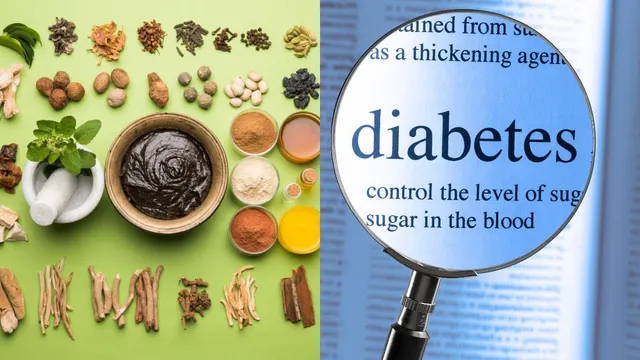- By Bornika Das
- Mon, 13 Oct 2025 04:03 PM (IST)
- Source:JND
Ayurveda, the traditional Indian medicine system, presents a proven and holistic approach to the management of lifestyle diseases such as diabetes and hypertension. Contrary to conventional treatments that tend to concentrate on the control of symptoms, Ayurveda strives to reestablish harmony within the mind, body, and spirit, diagnosis of genuine health. It regards metabolic disorders as the consequence of imbalances between the doshas (Vata, Pitta, and Kapha) of the body, exacerbated by bad eating habits, stress, and lack of exercise. Ayurveda shows a natural and sustainable way to disease prevention and long-term health through individual therapies, herbal remedies, and conscious practices.
An Ayurvedic lifestyle to control diabetes (Madhumeha) and hypertension (Rakta Gat Vata) focuses more on correcting the cause instead of just reducing blood pressure or sugar levels. This involves incorporating a balanced meal based on one's body constitution, daily physical activity such as yoga or walking, and stress-reduction measures like meditation and Pranayama. Herbal products such as Gudmar, Amla, Arjuna, and Ashwagandha are frequently recommended to correct metabolism and enhance cardiovascular function. In conversation with The Daily Jagran, Dr. Rekha R. Bhat, Ayurvedic physician at SOUKYA International Holistic Health Centre, shares a holistic approach of Ayurveda for diabetes and hypertension.
In Ayurvedic theory, diabetes is classified under Prameha, a group of twenty urinary disorders, with Madhumeha being closest to type-2 diabetes. It arises from aggravated Kapha Dosha, impaired digestion (mandagni) and toxin accumulation (ama) that disrupt metabolic pathways. Dr. Rekha R. Bhat states, “Hypertension, though not mentioned explicitly in classical texts, is understood through the concept of Rakta Vaha Srotas Dushti (vitiation of the blood channels) and often reflects imbalances in Vata and Pitta.” Both disorders are systemic and require correction at multiple levels, digestion, circulation, stress response and energy metabolism.
ALSO READ: Raw Honey For Monsoon Digestion: Expert Explains Why It Is A Natural Remedy For Acidity And Bloating
Diet is regarded as the primary form of medicine in Ayurveda. For diabetes, cereals such as barley, millets and green gram are advised as they support steady glucose metabolism. Bitter-tasting vegetables like bitter gourd and fenugreek seeds help regulate blood sugar and improve insulin function. Spices such as turmeric and cinnamon are also prescribed for their anti-inflammatory and hypoglycemic properties.
Dr. Rekha R. Bhat mentions, “Hypertension, on the other hand, benefits from a light and sattvic diet rich in fresh fruits, leafy vegetables, cucumbers and gourds, all of which cool the system and support vascular health.” Garlic is noted for reducing cholesterol and improving arterial elasticity, while excessive salt, fried foods and fermented items are discouraged as they tend to aggravate blood pressure and fluid retention.

Ayurveda For Diabetes And Hypertension (Image Credits: Canva)
Herbal therapies remain a cornerstone of Ayurvedic management. Gudmar reduces intestinal sugar absorption, Guduchi regulates immunity and glucose metabolism, and Amalaki (Indian gooseberry) supports pancreatic health and antioxidant balance. For hypertension, Arjuna (Terminalia arjuna) is considered a powerful cardiac tonic, strengthening the heart muscles and regulating lipid levels. Dr. Rekha R. Bhat states, “Sarpagandha, known for its natural alkaloid reserpine, has been traditionally used for lowering blood pressure, while calming herbs such as Jatamansi reduce stress-related surges.”
Equally important is the role of lifestyle. Ayurveda emphasises Dinacharya, where daily regimen with regular exercise, yoga, and breathing practices such as pranayama help regulate circulation, oxygenation and stress hormones. Dr. Rekha R. Bhat says, “Practices like Nadi Shodhana and meditation have been shown to calm the nervous system and stabilise blood pressure, while mindful eating and adequate sleep further restore balance. Seasonal detoxification therapies, known as Panchakarma, may also be recommended to clear accumulated toxins and reset metabolic pathways.”
By weaving together diet, herbs and lifestyle, Ayurveda provides an integrated strategy for long-term metabolic health. Its focus on prevention and root cause correction makes it especially relevant in today’s context, where lifestyle disorders like diabetes and hypertension are rising at an alarming rate. When adopted alongside conventional care, Ayurvedic therapies not only help manage these conditions but also empower individuals to regain vitality and well-being in harmony with their natural constitution.

